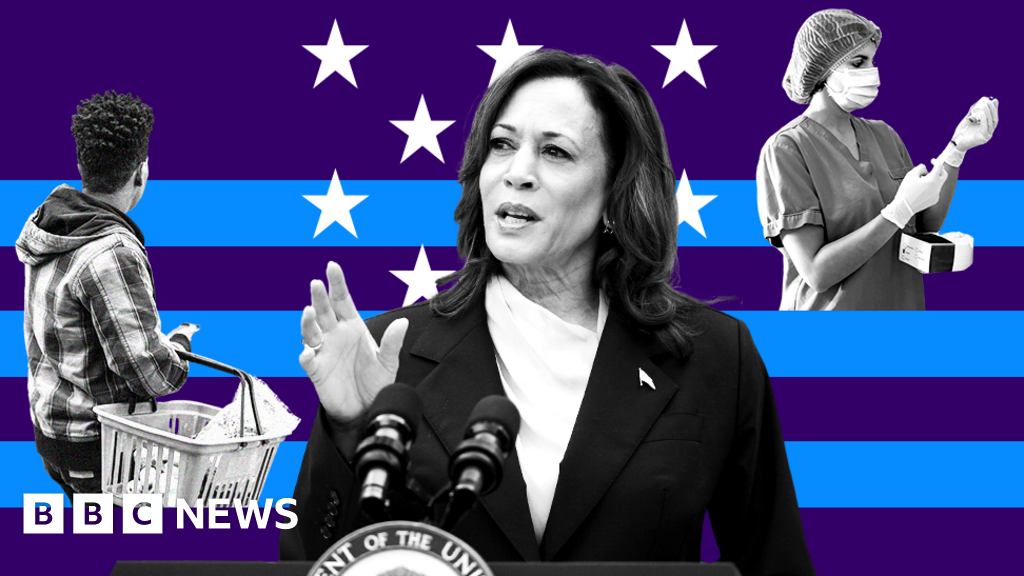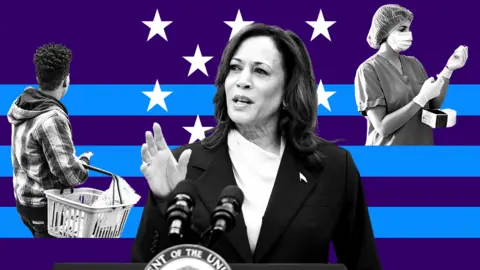

 BBC
BBCVice-President Kamala Harris has been riding high on a wave of favourable polls and energetic rallies since she became the Democratic Party’s nominee for president. But beyond the good vibes, where does she stand on the issues that matter to Americans?
Although she has yet to release a comprehensive platform, her time as a California senator and prosecutor, her 2020 bid for the presidency and subsequent role in the White House give hints as to where Ms Harris stands on a number of policy areas.
Over the years, some of her positions have shifted and even people close to her acknowledge she has sometimes struggled to define herself.
But as she accepted the Democratic nomination at the party’s convention in Chicago, she made an effort to contrast her vision for America with her Republican opponent, Donald Trump.
Here’s where she stands on 10 key issues.

Economy
As a senator, Ms Harris championed a number of progressive policies, including paid family leave, affordable housing and free tuition for low-and-middle income families.
As vice-president, she has been Mr Biden’s partner in passing major economic legislation – regularly labelled “Bidenomics” – which included major investments in infrastructure and green energy.
But with inflation and high interest rates continuing to bedevil American wallets, polls have shown that the economy continues to be top of mind for many voters.
Ms Harris has thus far released her economic plan, including mortgage assistance for first-time homebuyers, a tax credit for parents of newborns and bans on price gouging at the grocery store to help target inflation.
She said in her covention acceptance speech that her plans would create “an opportunity economy where everyone has a chance to compete and a chance to succeed”.

Immigration
Ms Harris’s position on the border has changed over time. In 2020, while campaigning for the Democratic presidential nomination, she held fairly progressive positions – such as promising to close down immigration detention centres.
In 2021, Mr Biden asked Ms Harris as vice-president to oversee the diplomatic effort around immigration issues on the US southern border.
Many Republicans have characterised her as a “border tsar”, but she was tasked specifically with working with Central American countries to address the “root causes” of why people were fleeing to the US.
As part of that effort, she announced in 2023 that she had helped raise about $3bn – largely from private companies – to invest in communities in the region, hoping to provide opportunities that would make immigrating to the US less attractive.
Earlier this year, she aided the effort to pass a hardline bipartisan border security deal that would have included hundreds of millions of dollars for border wall construction.
But Trump helped kill the deal, accusing Biden’s border policies of causing “death, destruction, and chaos in every American community”.
Ms Harris said in her DNC acceptance speech that she would “bring back the bipartisan border security bill that he (Trump) killed. And I will sign it into law”.

Abortion
Ms Harris has long supported women’s right to an abortion.
She played a key role in the Biden campaign’s effort to make abortion rights central to the 2024 election, and she has long advocated for legislation that would enshrine reproductive rights nationwide.
That position has not changed.
“When Congress passes a law to restore reproductive freedoms, as president of the United States, I will sign it into law,” she said at a rally for her 2024 campaign in Atlanta, Georgia.
She reiterated that commitment in her DNC acceptance speech.
Ms Harris was the first vice-president to visit an abortion clinic, and she toured the country after the US Supreme Court overturned Roe v Wade in 2022 to speak about the growing number of abortion bans in the US – often framing the issue as one about personal freedom.
Powerful pro-choice advocacy groups, such as Emilys List and Reproductive Freedom for All, have officially endorsed Ms Harris since she started her presidential run.

Nato and Ukraine aid
While much of her early career focused on the state of California, since going to Washington as a senator in 2017, Ms Harris has become more involved on the global stage.
As senator, she traveled to Afghanistan, Iraq, Jordan and Israel.
As vice-president, she has met 150 world leaders and visited 21 countries.
She attended the Munich Security Conference in the past year, and she delivered remarks in support of western security alliance Nato that denounced isolationism.
She has also vowed to support Ukraine in its war against Russia “for as long as it takes”. Ms Harris represented the US in June at the “peace conference” convened by Ukraine in Switzerland where she reaffirmed Washington’s support.
She noted in her DNC speech that had she met with President Volodymyr Zelensky five days before the Kremlin ordered the invasion of Ukraine to “warn him about Russia’s plan to invade”. She said that she then “helped mobilise a global response”.
In her speech she also pledged to ensure that “America – not China – wins the competition for the 21st Century” and that “we strengthen – not abdicate – our global leadership”.

Israel-Gaza War
Ms Harris has been a longtime advocate for a two-state solution, and she has called for an end to the war in Gaza.
As president, she said during her DNC acceptance speech that she would ensure “that Israel is secure, the hostages are released, the suffering in Gaza ends, and the Palestinian people can realize their right to dignity, security, freedom, and self-determination”.
While serving as vice-president, she has been more open to criticising Israel during the Israel-Gaza war than Mr Biden.
She was one of the first members of the administration to call for an “immediate cease-fire”, raised concerns over the “humanitarian catastrophe for Palestinians” and charged Israel with ending the conflict.
She held what she called “frank and constructive” talks with Israeli Prime Minister Benjamin Netanyahu when he visited Washington in July.
She said she told Mr Netanyahu that she had “serious concerns” about casualties in Gaza and that the way Israel defended itself mattered.
“It is time for this war to end,” she said after face-to-face talks at the White House.
She has not supported an arms embargo on Israel, however, as some on the US left have called for.
At the convention, she said she would “always stand up for Israel’s right to defend itself and I will always ensure Israel has the ability to defend itself”.

Taxes
In 2017, while a senator, Ms Harris supported a number of progressive tax programmes, co-sponsoring a bill with Bernie Sanders to expand social security for the elderly by increasing the tax rate on investments.
As a presidential candidate in 2019, she supported a corporate tax rate of 35%, up from 21%.
This was more aggressive than President Biden’s proposal, which she also supported, of an increase to 28%.
A campaign official told the BBC that the vice-president would continue to back President Biden’s proposal of not raising taxes on Americans earning less than $400,000 (£310,000).
Ms Harris said during her DNC acceptance speech that she would “pass a middle class tax cut that will benefit more than 100 million Americans”, though details on that plan remain fairly sparse.

Healthcare
As California’s attorney general, Ms Harris and her office often used anti-trust laws to keep insurers, hospitals and drug companies from raising customer costs.
When she became a US senator and later a 2020 candidate for president, she held more progressive views than Mr Biden, supporting expanding Medicare and publicly-funded health-care programmes.
Medicare is US government-funded healthcare that covers those aged 65 and older and those younger with disabilities.
Ms Harris previously had supported Medicare for All, a policy that would allow all Americans access to the system. It was a position that became popular among many progressive Democrats before Mr Biden’s presidency.
During the same period, she also backed eliminating private healthcare insurance but then partially walked that back, releasing a plan during her 2020 presidential campaign that would put the US on track to offer government-funded health insurance over 10 years but wouldn’t fully eliminate private insurance companies.
That’s not the case now. Her campaign told the BBC that, as president, she would not push for a single-payer system.
While she was vice-president, the White House reduced prescription drug costs, capped insulin prices at $35, allowed Medicare to negotiate drug prices and capped out-of-pocket expenses for Medicare drug coverage.

Crime
Ms Harris started her legal career prosecuting child abusers and sex traffickers before being elected district attorney of San Francisco, then California’s attorney general.
Her offices increased conviction rates, particularly of violent criminals, though that history led to criticism from the progressive left, which at times labelled her “a cop”.
Meanwhile, the right has accused her of being soft on crime, although her record is contradictory. As a prosecutor, she declined to seek the death penalty against someone who killed a cop, but as California’s attorney general, she fought for the state’s right to keep using it.
Ms Harris has also used her past as a prosecutor to serve as a major contrast with her opponent, who was convicted on 34 charges in a hush-money scheme to illegally influence the 2016 election.
She made mention of his conviction in her DNC acceptance speech: Trump “was found guilty of fraud by a jury of everyday Americans. And separately, found liable for committing sexual abuse.”

Climate
Ms Harris has long advocated for tough laws to protect the environment.
As a prosecutor, Ms Harris defended California’s climate laws and sued oil companies for environmental damage. She also called for climate change policies via a “Green New Deal” during her 2020 presidential campaign – some of which has come to fruition under the current administration.
During a CNN presidential debate in 2019, she said that “there is no question I’m in favour of banning fracking”, which is a technique for recovering gas and oil from shale rock. She has reversed her position since throwing her hat into the 2024 presidential race.
As vice-president, she helped pass the Inflation Reduction Act, which has funnelled hundreds of billions of dollars to renewable energy and electric vehicle tax credit and rebate programs.
Last year, she noted in a speech that it constituted “the largest climate investment in our nation’s history” and emphasised the need to protect against extreme weather.
She only made brief mention of the climate in her DNC acceptance speech: “The freedom to breathe clean air, drink clean water, and live free from the pollution that fuels the climate crisis.”

Gun laws
Ms Harris has a history of backing gun safety regulations throughout her political career, and she successfully defended California’s gun laws when they faced legal challenges as the state’s attorney general.
As vice-president, she has overseen the White House Office of Gun Violence Prevention, and earlier this year announced the creation of resource centres to support the implementation of red-flag laws – aimed at keeping firearms from those who may harm themselves and others.
She also encouraged states to tap into $750m in federal funds that the Biden-Harris administration made available for crisis intervention programs.








